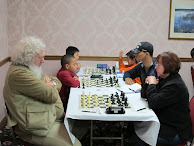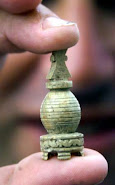Unbelievable! They are making exactly the same stupid mistakes that officials in the United States did in the 1950-60's and earlier by destroying irreplaceable buildings, forest preserves, waterways and burial mounds, etc. in the name of "progress." Guess the Red Chinese bureaucrats and officials don't read their history, either. Or perhaps they think they're so frigging superior to us wide-eyes they don't give a flying fig - all the fuss about preserving the past is just a lot of crap.
This is one more reason NOT to visit China. The air is filthy, the water is poison (where you can find any to drink, that is), and I just read in a travel review in today's Journal Sentinel that there are 'squat and dump' wide open "toilets" in Bejing. Toilet paper and sinks NOT provided, you just pull your pants down and deliver your load in front of thousands of people walking by. Yep - in Bejing, the premiere city of the People's Republic. Very sanitary, I'm sure. So much for 'superiority.' Gag me!
From Peoples Daily Online
Most blame officials for loss of relics, survey finds
08:39, May 14, 2010
More than 70 percent of respondents in a recent survey accused government officials of destroying the country's relics for their own political benefit.
The survey polled 2,284 Internet users and was released by the social survey center of the China Youth Daily on Tuesday.
Ninety-three percent of those polled supported preserving old buildings and 72 percent said ancient buildings were demolished because of government officials' push for high local GDP growth.
Of those polled, 50.8 percent were in their 20s and 31.7 percent in their 30s.
The poll came amid recent scandals in which historical sites were pulled down to make way for skyscrapers in the country. In the past 20 years, about one-third of the former residences of celebrities in Beijing alone have been demolished, including those listed as cultural relics, the China Youth Daily reported. Nationwide statistics on the destruction of ancient sites in similar cases are unavailable, but many believe the cases are numerous.
In April, an ancient city wall was reportedly destroyed because the transport bureau of Dali in Yunnan province wanted to broaden the road. Also in April, developers filled a scenic lake in Dali's Erhai Park to build a luxury villa.
Two weeks ago, an old blockhouse was removed to make way for railway construction in Nanjing, capital of Jiangsu province.
"The fate of ancient buildings is in the hands of government officials who prefer GDP growth to values of antiquity," said Wang Jilan, a 51 year-old Beijinger whose siheyuan - a traditional courtyard surrounded by four buildings - was dismantled last month.
Wang said thousands of siheyuan had been buried under tall buildings in the past decade. "I do not feel Beijing is my hometown anymore," she said.
In the survey, 93.4 percent of the respondents said it is necessary to protect ancient buildings, with 56.3 percent saying it was "of great importance".
Similarly, 72.2 percent of those polled said government officials should be responsible for vanishing culture relics and 67.4 percent said the officials are undermining the sustainable development of the city.
Only 20.3 percent of the respondents said dismantling ancient buildings can "elevate people's living standard in the short term".
"Government at all levels, relic protection authorities, urban planning departments and local residents are all responsible for the fate of the relics," said Zhang Zhanlu, an associate professor with Renmin University of China.
About 57 percent of those polled said that local residents should be entitled to decide the preservation of an ancient building.
Twenty percent of those polled said it should be decided by the central government, 14.4 percent said local governments should decide and 5.8 percent said government officials should fill that role.
"Preserving the old architecture is equivalent to preserving a source of the city's spirit and its future development," Zhang said.
Source: China Daily
Subscribe to:
Post Comments (Atom)



































No comments:
Post a Comment